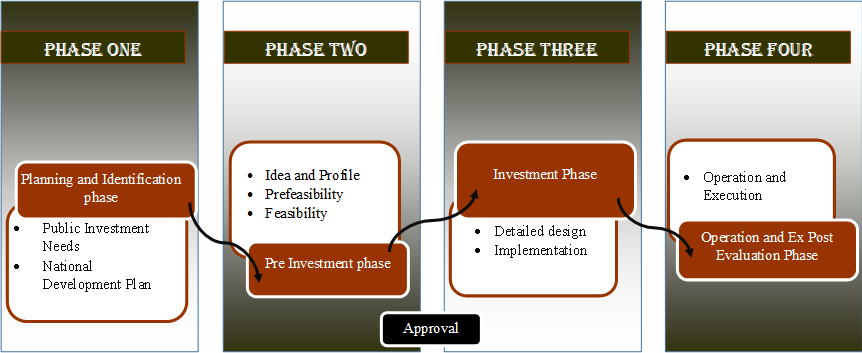PIMS Framework for Uganda

Project Indentification
This is the first phase of the project cycle. It is concerned with the generation of project ideas and the focus at this stage is on establishing the project idea’s relevance to national priorities as defined in the National Development Plan. This phase requires the project sponsoring agency to build a strategic business case for the proposed project idea through the preparation of a concept note which is subjected to preliminary screening at the (i) vote level by the Project Preparation Committee (PPC), (ii) sector level by the Sector Working Group (SWG) and (iii) by the Development Committee (DC). Approval of the project concept note by the DC amounts to initial registration of the project and permission for the sponsoring agency to proceed to the profiling stage of the pre-investment phase.
Pre Investment
The pre-investment phase includes project formulation, and appraisal. Project formulation takes the form of developing the project concept further into a detailed project profile or framework whose objective is to describe the project deliverables/results and how they will be monitored and measured. In other words, the results chain is defined in terms of the project inputs, activities, outputs, outcomes and the overall project impact. At this stage therefore, a conceptual framework of the project is developed to include (i) the hierarchy of objectives (ii)indicators that will be used to measure success for each of the project objectives (iii) how information or data on the indicators will be obtained (means of verification) and (iv) targets for each indicator set and baselines established and (v) underlying assumptions that need to occur for the project to be successfully executed.
Investment
During the Implementation phase, the project is mobilized and executed. Detailed project designs if not already finalized as part of the feasibility study, are undertaken as well as actual implementation of the developed project plans. This may require the tendering and awarding of contracts for technical assistance or works and supplies. The defining characteristic of this stage is the availability of the appropriate capabilities and capacities, including the capacities to disburse funding, procure materials and undertake engineering and construction works on the project. It also involves processes related to monitoring and adjusting implementation to ensure the achievement of development objectives.
Operation and Ex-Post Evaluation
The fourth phase in the project life cycle is the operations and ex-post phase, where the project evolves into its operation stage to produce its final fully operational deliverable, (e.g. a new plant, product, system, etc.). The management processes, tasks and tools at this stage are shifted towards the effective and efficient delivery of the products and outputs from the new services, plant or mine. A permanent organizational structure is put in place to replace the project implementation/construction team. The new team ensures generation of returns and/or produces the economic benefits for which it will have to incur operational expenses (such as production, maintenance costs, etc.). This phase is the responsibility of the project-sponsoring agency.

